Susan McCaffery lives in Billericay, in Essex. She's 72 and, thanks to the UK Independence Party, a member of the local town council. It's a hot Wednesday afternoon and she is talking to me in her sitting room, where there's an organ in one corner and a few piles of bumf from the Pentecostal church of which she's an enthusiastic member.
Until 2007, she was also the minutes secretary of Basildon Conservative Association. "But I was just so unimpressed with their discussions, with the lack of initiative," she says. "There was no desire to go forward. No vision. In the end, I thought, I can't stand this any longer.
"People want, in a sense, to revert back to how we were," she says. "You know: we won the second world war, only we've lost it now, because Germany's taken over… But we had people then, ready to stand up like Churchill and say, 'This is what we're going to do.' A lot of people in this country are saying, 'Where are the leaders? Where are the people prepared to take a stand?' "
As well as the awfulness of modern politicians, immigration, the amount of money Britain pays into the EU, the alleged failings of multiculturalism, the need drastically to cut the UK's foreign aid budget and the dazzling brilliance of the late Margaret Thatcher, Ukip members mention the second world war a lot. But McCaffery's take on 1939-45 is that bit more interesting. Unprompted, she explains her support of the theory that Britain eventually saw off the Germans thanks to the power of prayer. "The soldiers at Dunkirk were able to come back on a calm sea, whereas the German aircraft couldn't take off from their places because the weather was so bad… There were all sorts of changes that happened, and part of it was a result of people praying and asking God for help."
She's sitting on a small sofa. To her right is James Moyies, Ukip's eastern counties regional chairman, an urbane Scot with a background in Conservative politics, who's also the director of a "field marketing" firm. On her left is 21-year-old Carl Whitwell, who splits his time between working for a secondhand electrical goods outlet in Southend and assisting with Ukip's youth wing (his Twitter feed features the slogan "My only faith is common sense"). Neither looks very comfortable with the conversation, but McCaffery gamely carries on. Ukip members, she says, may not all be Christians, but the party has "a Christian ethos" and a constitution that "goes alongside what the Ten Commandments would say".
A good example, she says, is the party's opposition to gay marriage. "There's lots of Christians standing against that because it's not right," she says. "How can you have two people of the same sex and call them married?" She lets out a sarcastic guffaw.
Britain, she says, should be a Christian country, like it used to be. Should it be a country with other faiths as well? "Well, it is, isn't it? But, you see, other faiths bring with them different… spirits. And that's the problem. God loves all people: he loves Muslims, he loves Hindus, he loves Sikhs and so on. But it's the spirit that humans are not particularly aware of that causes some of these extreme Muslims to get bomb equipment" – there's a brief detour into the recent case of six Islamist fanatics, jailed for plotting an attack on the English Defence League – "and they send hate messages about the Queen and David Cameron. That's a different spirit to the spirit that we're used to. Because it's not a Christian spirit."
Looking ahead, what does she think of Ukip's prospects? Intentionally or not, she uses biblical language. "Oh, you can't stop it. It's a flood."
Perhaps it is. Less than 48 hours after I leave Billericay, Ukip will win nine county council seats in Essex and 147 across England. Its national share of the vote will come in at 23%, only two points behind the Conservatives and nine ahead of the Lib Dems. The face of the party's leader, Nigel Farage – always locked in some expression of extreme merriment and usually inches from a pint of bitter – will once again be staring from all the newspapers. The following week, the government will emphasise measures in the Queen's speech aimed at tackling immigrants' access to benefits, medical treatment and housing. And the Conservative party will be in a state of tortured angst, with at least one MP proposing a Tory-Ukip pact and dozens of others wondering if they should now advocate not just one referendum on the EU, but two. For a day or two, in fact, it will feel a bit as if Farage is getting close to running the country.
Out in the real world, meanwhile, Britain's newest political tribe carries on growing. Ukip, founded in 1993, currently claims a membership of around 26,000, and its spokespeople say that around 1,000 new people are joining every month, many from the Conservative party. As things stand, its key heartland lies in the east of England, a part of the country that has attracted relatively large numbers of migrants from eastern Europe. Ukip's home turf stretches from Kent, through Essex, up to Norfolk and across to Cambridgeshire and Lincolnshire; in the latter county, the party is now the official opposition.
Encouraged not just by local election results, but also by its habitual second place in recent parliamentary byelections, the party is in ebullient mood, believing it can top the poll in the European elections of 2014. Even if it is squeezed at the 2015 general election, it has hopes of getting its first properly elected MPs. To some, even though its self-authored Google listing brands it as a "libertarian, non-racist party", it will always give off the whiff of a kind of rightwing politics that often blurs into the lunatic fringe. To its supporters and members, though, it represents an exciting revolt against the metropolitan consensus: not so much a breath of fresh air as a sharp gust of that very British booze-and-fags smell that once wafted from our pubs.
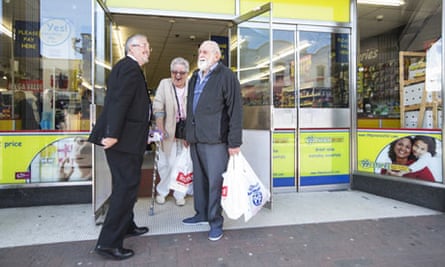
In the Essex town of Wickford, I meet two more UK activists: Paul Downes (64) and Nigel Le Gresley (62), who are having a coffee in the local Co-op supermarket. Until February this year, Downes – a former estate agent – was a Conservative activist, but he had long felt his loyalty dwindling, thanks partly to David Cameron and George Osborne's silver-spooned backgrounds. Le Gresley, whose last job was with BT, says he has voted for the Liberals, Conservatives and even New Labour, but now thinks the political class has floated into its own orbit. "You need to have people who've been there, done that and got the T-shirt," he says. "The lot we've got now haven't been there or done anything. And they haven't got the T-shirt."
There is talk of "the British way of life". As Downes sees it, "A lot of people of our generation – the grey pound, sort of thing – really feel, why has our culture become unimportant?" There is also unease about same-sex marriage. "The problem is, you're going to put churches in a position where it won't be long before someone will go to the European court and say they're being discriminated against," he says. "So it opens up a whole hornet's nest."
The two also talk, at some length, about the EU – once again with the seemingly obligatory references to Hitler and Churchill. "My father fought in the second world war, as millions of people from this country did," Downes says. "We fought to free Europe from tyranny. And we're now in a position where we're almost being… controlled by a communist regime, in my view, where the EU controls everything."
"It may not necessarily be communist, but it's authoritarian," Le Gresley offers. "It's no longer non-democratic: it's anti-democratic."
For some of the Ukip tribe, the need for Britain to leave the EU still pushes all other issues to one side. For others, it takes its place in a mess of grievances shared by many British people. Some of these issues – immigration, wind farms, even the smoking ban – are reflected in Ukip policy. Some aren't: there is an obvious tension between, say, Ukip members' and voters' complaints about the low end of the job market, and the party's avowed belief in free-market economics. But for the time being, such tensions come down to matters of mere nuance: Ukip is now the party for a lot of people who have simply lost patience with politics and, as such, its supporters can apparently project on to it anything they like.
Keith Gibbs, 65, joined in 2012. He's an ex-policeman and another disciple of Margaret Thatcher. "She looked after the armed forces and the police, and I'm all for that," he tells me, nursing a lunchtime pint in a pub garden in nearby Rayleigh. "I mean, we're becoming a third world country really, the way we're going."
How? "Our military's going down and down, and you're going to get to a stage where we won't be able to defend ourselves."
Throughout this conversation, Whitwell from Ukip's youth wing maintains a slightly irritating presence, perching on the edge of the table and trying to put a PR gloss on what Gibbs says. "If that happens," he says, to no one in particular, "we'll have to rely on the European Union."
We move on to immigration. "There's lots and lots of people coming here, and they're just coming for the benefits," Gibbs says. "Take something like that woman who came here: she's got four kids already, she's expecting twins, and that cost the government – us, taxpayers, the NHS – £200,000, to treat her to have twins."
"We don't blame the people for doing it," Whitwell says.
"You can't blame them," Gibbs adds. "It's the bloody system."
Once home, I spend time trying to find anything online that corresponds to Gibbs' tale about the woman with four kids and twins on the way, but find nothing. The same goes for his claims about what he has seen at a major public-sector employer in Southend.
"I used to watch people come in, to the pay desk," he says. "Every Friday, they used to come in, and sign, and get a brown envelope. I had a look one day. There was a big list, five pages long – people who just used to come in and get paid money." A pause, for effect. "All immigrants."
Next, I am introduced to 44-year-old Jamie Huntman, a native of Barking who owns a timber business near Thundersley, a few miles south of Rayleigh. His pride and joy is a prefab dog-grooming parlour that he has put up on one side of his yard and handed over to a local woman who now turns a £1,000-a-week profit. Neatly dressed in a shirt, tie and green-brown slacks, Huntman explains his long fight over this new venture with Essex county council's planning department, which seems to have nudged him in Ukip's direction.
As with so many Ukip members, he pines for the days when politicians had tasted at least a flavour of lives like his. "They go straight from Eton into Oxbridge and into Westminster," he says. "I've always been of the opinion that you never judge a man until you walk a mile in his moccasins. But what do they know about standing in my yard, serving wood or grooming a dog?"
A few days ago, I remind him, the somewhat notorious Ukip MEP Godfrey Bloom appeared on 5 Live, reiterating his previous claim that employers could not be blamed for not wanting to give jobs to women who might then get pregnant. What did he make of that?
"He's a very entertaining man. I always watch his clips on YouTube. He makes his point; he overstates his point sometimes. But the fact is… the hardest job a small business has is finding staff. And remember: if someone comes to us and then gets pregnant – if they're off work for quite a number of months, it's very difficult to survive. It's just pounds, shillings and pence, really.
"It's very difficult running a small business," he says. "There was something in what he said. Maybe the way he said it was… Well, who am I to say? He's an MEP and I'm just a man in Thundersley."
Two days later, Huntman is a little bit more than that. Alongside Keith Gibbs, Nigel Le Gresley and six others, he is a freshly-elected Ukip county councillor and the party's deputy leader in Essex, having beaten a sitting Tory called Bill Dick. When I speak to him on the phone, he sounds amazed. "I've got to admit I was shocked," he says. "Though not as shocked as the Tory, who seemed to go very pale. My feet haven't touched the ground." As far as national politics is concerned, he sounds equally surprised. Ukip, he says, "seems to be steering the Tory agenda at the moment. They can't say anything without mentioning one of our policies. It's a force for good, I think."
"It all started in Huntingdonshire," Farage said recently. He was referring to the miracles worked by his party in the small Fenland town of Ramsey. It's now the party's key eastern redoubt, as proved by the sign that greets you as you enter the place: a huge board on a patch of grass that carries two messages: "Let's put Britain first for once" and "Thank you" – a reference to the avalanche of votes that came Ukip's way on 2 May. Since 2011, Ukip has run the town council here, with nine out of 17 councillors – and as things stand, it remains the only elected authority the party controls.
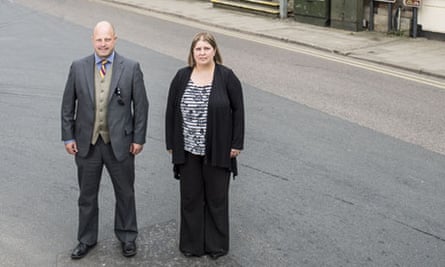
For the past six years, Ramsey has been the home of Lisa Duffy and her partner Peter Reeve, who moved here from Manchester and have been Ukip members since 2004. She is the mayor of Ramsey and Ukip's national campaign director. He sits on the town council, the local district council and Cambridgeshire county council: on 2 May, he scored 67% of the local vote, the highest share managed by any Ukip candidate. As well as working full-time for a Ukip MEP, he serves as Ukip's national nominating officer, the person ultimately responsible for signing off its candidates for elected office; his mother, Shirley, is one of Ramsey's Ukip town councillors. Among Duffy and Reeve's six children is Jazmine, 13, who has already spoken at Ukip events: her mother says proudly that she recently gave Farage six years' notice, suggesting she wanted to be the leader before she turned 20.
Reeve, 36, is an animated, engaging presence, dressed in a suit, waistcoat and yellow and purple Ukip tie. He comes from a farming family in Norfolk; he says his father would always put up Conservative hoardings at election time, until the fall of Margaret Thatcher. "That hurt my family, absolutely," he says. "They said they wouldn't help the Tories any more." His basic politics, he explains, is "libertarian". He goes on: "If you're asking me rather than the party, I think all taxation is immoral… I genuinely believe that if there's a real need for people to give money, then people will give it if they're not forced to."
This takes me aback. He really thinks that an entirely voluntary system could fund, say, schools, hospitals, the police and the roads? "If people needed roads and there wasn't this comfort blanket of the state providing everything, they'd be built." What about the NHS? "I'm probably straying too far off policy now. But people would donate to make sure people were fit and healthy."
I came to Ramsey a couple of months ago and spoke to local people about Ukip's success: I half-expected to find a boiling hotbed of anger about immigration and Brussels bureaucrats, but instead found a sleepy, apparently almost apolitical place, where people's biggest moan was the dire effect a big Tesco has had on local shops. On the high street named the Great Whyte, where most of the shops shut at 3pm and human traffic is usually no more than a trickle, people tended to put the party's rise down to the hard work put in by its activists, and Reeve in particular.
He is renowned for coming into town every morning and evening to open and shut the public toilets, which now feature signs displaying his mobile number. Before Ukip won control of the town council, Duffy says, he would "clear up dog muck, do litter-picks and clear out the cemetery – if someone had a problem, they could turn to him". Among his most frequent phone calls, she says, are those from people who have locked themselves in the loo.
I speak to both Duffy and Reeve outside a local cafe with the worryingly European name the Rendezvous. Immigration, Duffy agrees, is much more of an issue up the road in Peterborough, though in Ramsey "it's getting stronger. There are more people talking about it now than when we moved here. Class sizes are going up. They're seeing more immigrants come into the town. But it's not on the same level as, say, Peterborough or Corby. When someone says to me, 'There's three immigrants in our class' and they're worried that their child might be kept back because they've got to have extra support to help them speak English, I'm just like, 'You're actually quite lucky that there's only three.'" Does she know, say, any Polish people? "One or two. But purely because they're in the same class as our children."
Duffy – who's 44 and used to be a store manager for TK Maxx – has been in charge of Ukip's campaigning in all those recent parliamentary byelections, where it has sounded its customary loud notes about the supposed multitudes soon to arrive from Romania and Bulgaria. Given that in some places there are real tensions around immigration, not to mention outbreaks of violence, does she ever worry that Ukip's campaigning might make things worse?
"I think it's how you put that message across," she says. "It's about talking to people, showing them what the effects are, how it's having an effect on the benefits system, on the housing system: talking through real-life situations. Saying, 'It's not the people – it's the open-door, mass immigration policy the country has got. That's what's got to change.' "
In Eastleigh, where the campaign Duffy commanded led to Ukip beating the Tories to second place, its electioneering included one leaflet claiming: "Next year, the EU will allow 29 million Bulgarians and Romanians to come to the UK." The number was derived by simply adding together the two countries' populations. Which is alarmist, to say the least, isn't it?
"It's not a lie," she says.
But the implication is that a lot of those 29 million people will soon arrive. And that's not going to happen.
"We were very clear in that leaflet that the projected numbers are currently sitting at around 4 million," she says. "That was based on the research that Paul Nuttall [MEP and Ukip deputy leader] did when he went over to Romania."
Back at home, I'm reminded that official figures have estimated initial numbers at around 13,000, though government ministers have expressed doubts about that number. The famously hardline pressure group Migration Watch reckons that numbers of new arrivals from both countries will be in the region of 250,000 over five years. Back in Ramsey, I ask the same question again: isn't Ukip needlessly scaring people?
"It does scare people. But not unnecessarily. It's just being honest."
But 29 million is its headline figure. And if you didn't know any better, you'd look at that leaflet and think that many people were about to arrive.
"Yeah," Duffy says. "But the whole point is, you grab the attention with the headline and then hope people will read the article underneath and find out more about it."
One or two Ukip candidates in the local elections were accused of very rum doings, and some were dropped. One woman was suspended after online posts were discovered blaming the second world war on "the Zionist" (she claimed her account was hacked); another had saluted Russia for banning gay pride marches and offered the opinion that homosexuality could be kept at bay via vigorous exercise. Another was alleged to have been pictured giving a Nazi salute, though the Ukip leadership accepted his claim that he was actually trying to stop his girlfriend taking a photograph of him "imitating a pot plant".
Given Reeve's job as the national nominating officer, he must have had an interesting time. "We were expecting a significant amount of risk from fielding a lot of candidates," he says. "We didn't have the capacity to vet every candidate at council level… We had to take people at face value, and we let the local branches vet them as much as they had the capacity to do it." The selection procedures for next year's European elections, he says, are much more rigorous – and as far as the past histories of members are concerned, the BNP and the English Defence League are both proscribed organisations.
So how often has he had to throw out people's membership applications? "Oh jeez," he says. "All the time. There have been some really sad cases of kids, 19 or 20 years old – a couple of years ago, they joined the BNP, and when they went to a meeting they were all racist nutters, and they left. I've had numerous conversations with these kids and said, 'Look – as much as we would defend your right to join a nutty organisation, you will have to take responsibility for that.' "
At the general election of 2015, Duffy thinks Ukip's share of the vote will be higher than the Lib Dems'. "Realistically, wouldn't it be nice to get between 10 and 15 MPs elected?" she says. And in terms of the big forces of history, she knows why she and her comrades put all the effort in. "Why did my grandad go to war?" she wonders. "What did he fight for?" From there she's off, into familiar themes: how much money we give to the EU, Britain's foreign aid budget.
From the next table, there comes a sudden movement. The two women sitting at it are probably old enough to remember the era of Spitfires, rations and prayer supposedly stilling the Channel; given Ukip's local successes, I'm half-expecting them to come over and offer Duffy and Reeve their congratulations. But no: they are trying to enjoy a quiet al fresco fag. "Do you think you could keep it down a little bit?" one says, suddenly looking angry. "We can't hear ourselves."
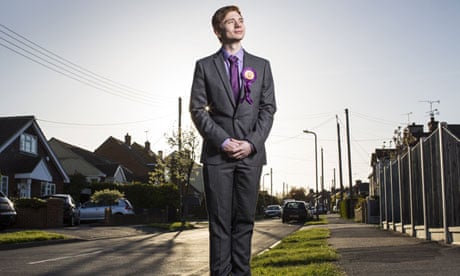

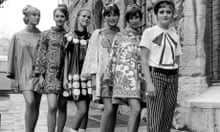

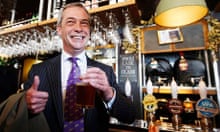
Comments (…)
Sign in or create your Guardian account to join the discussion